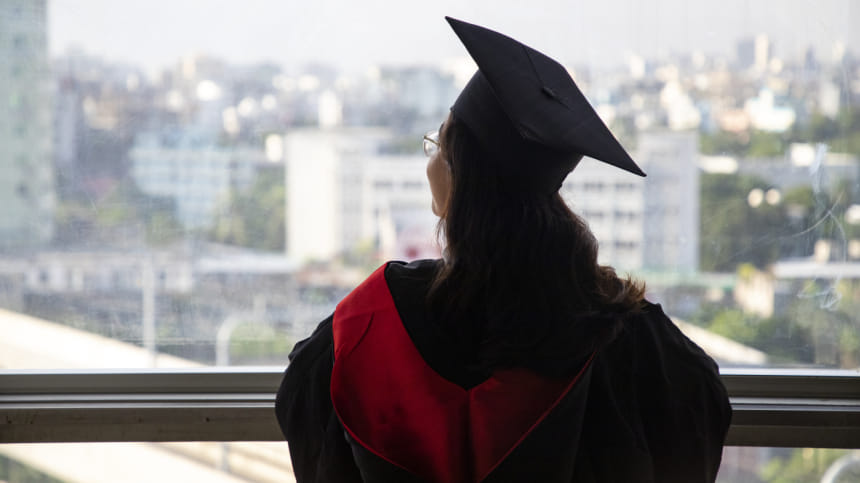Reverse brain drain: just another trend or a real opportunity?

On the morning of August 4, social media was abuzz with the #reversebraindrainbd trend. Bangladeshi expatriates, many of whom had long left the country in search of better opportunities abroad, began to speak of returning home. They envisioned contributing to the reconstruction of a nation on the verge of new possibilities. The hashtag went viral, igniting conversations about what it would take for skilled professionals to come back and offer their expertise. It was a moment of collective hope—a window into what Bangladesh could become if its brightest minds returned to build the future they had always dreamed of.
But now, months later, it appears that the initial momentum has faded. The conversation seems to have stalled, and we are yet to see a tangible wave of skilled expatriates returning home to rebuild alongside us. What happened? Was the #reversebraindrainbd just another fleeting social media trend, or is it still possible to turn this vision into reality?
'Brain drain' is a term developing nations like Bangladesh are all too familiar with. For decades, we have watched as our best and brightest—engineers, doctors, entrepreneurs—have left for countries with better employment opportunities, higher salaries, and more stable political environments. The 'brain drain' has cost us dearly, with the country losing not just skilled professionals but also the intellectual capital needed to foster innovation and growth.
In contrast, 'reverse brain drain' refers to the return of these expatriates to their homeland. It is a phenomenon driven by various factors: visa expirations, family commitments, or, in some cases, the desire to make a difference in one's own country. The promise of 'reverse brain drain' suggests a future where skilled individuals return to invest in their homeland, bringing with them the knowledge, experience, and global networks they have gained abroad. But the question remains: are we truly ready to bring them back?
One of the central narratives driving the #reversebraindrainbd movement was patriotism. Many expatriates voiced a sense of duty to return home after the recent revolution. The message was clear: the time had come to build the nation we had all dreamed of—a Bangladesh that stood tall, free from corruption and political oppression, where opportunities for growth were abundant.
But while patriotism can be a strong motivator, it alone is not enough. For most expatriates, practical considerations weigh far more heavily than patriotic sentiment. After years of building successful careers abroad, the decision to return is not made lightly. Questions of job security, income stability, quality of life, and career growth are at the forefront of their minds. Many of them now wonder if Bangladesh can offer them the same opportunities they have grown accustomed to abroad, or if they will find themselves in a country still grappling with the same old challenges: bureaucracy, corruption, and economic uncertainty. Patriotism may ignite the desire to return, but it is the practical realities of day-to-day life that will ultimately determine whether these skilled professionals decide to make Bangladesh their permanent home again.
We need to ask ourselves: are we truly prepared to welcome these skilled expatriates back? The reality is that the infrastructure needed to support their return may not yet be in place. While the fall of the regime has opened new doors for political freedom, we still need to address the systemic issues that have long plagued the country. We have made significant strides in development over the past decade, but we cannot ignore the fact that certain sectors remain underdeveloped. For many expats, the decision to return will hinge on whether they can find meaningful employment or create their own opportunities in a relatively stable and supportive environment. Do we have the frameworks in place to support innovation? Is the economy ready to absorb and retain top talent? These are questions we must answer if we want to turn the #reversebraindrainbd trend into a tangible reality. It is not enough to simply call for people to come home—we must actively work to create an environment where they can thrive.
Conversely, it must be understood that there would only be a few ready-made opportunities waiting for these people in Bangladesh. The beauty of our current situation is that there is potential for virtually unlimited opportunities to create something new. A generation of young people, many of whom once dreamed of leaving Bangladesh, have stayed to fight for the country's future and are now actively working to rebuild the nation from the ground up. They have proven that change is possible, but they cannot do it alone from here. Our expatriates can make a difference—but not by waiting for perfect opportunities to fall into their laps. Instead, they must come back and create those opportunities themselves. The fall of the regime has cleared the way for innovation and new ideas. Whether it is starting a new business, launching a tech startup, or contributing to social welfare projects, now is the time for those with skills and experience to bring their ideas to life in Bangladesh.
We need our expatriates to return—not out of a sense of obligation or guilt, but because they see the potential in what we are building together. A nation is only as strong as the collective will of its people, both at home and abroad. And as we work to rebuild Bangladesh, we must do so with the knowledge that the challenges ahead are not insurmountable. It is time now to show the world what we are capable of when we come together to build something better.
To everyone who posted on social media about returning, I say this: now is the time to act. There are no ready-made opportunities, but there are endless possibilities waiting for those bold enough to create them. Come back, and let us build our dream nation together.

 For all latest news, follow The Daily Star's Google News channel.
For all latest news, follow The Daily Star's Google News channel. 









Comments